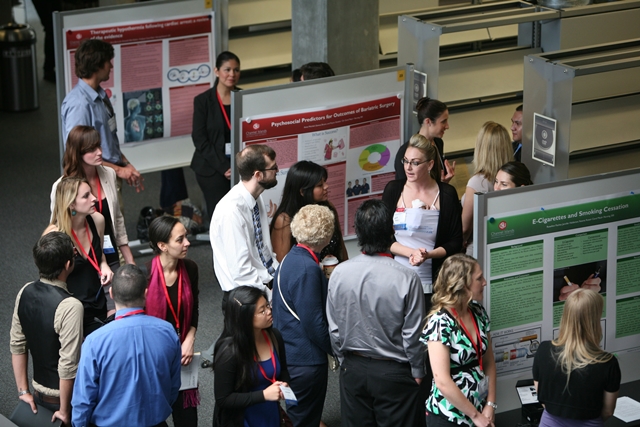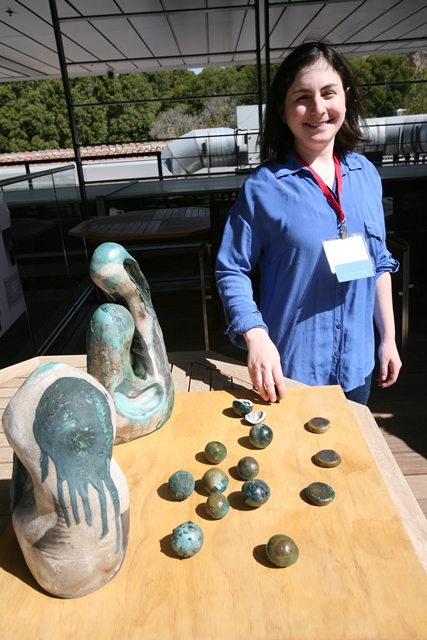
Camarillo, Calif., May 1, 2015—CSU Channel Islands (CI) undergraduates have been hard at work researching everything from cancer to mercury levels in fish to internet addiction.
On Saturday, May 9, the collaborative work of 30 faculty-student teams will be on display at the Sixth Annual Student Research Conference from 9 to 11:30 a.m. at the John Spoor Broome Library on the CI campus.
Nearly half of all graduating seniors take part in some form of research or creative activity. Among the projects at the conference are the results of an elaborate screening of more than 100 potential anti-cancer agents conducted by a team of four undergraduate and three graduate Biology students.
The screening isolated six chemicals that show promise in inhibiting and slowing the invasive properties of several women’s cancers including breast, ovarian, uterine and cervical cancer.
“We will show data as to how some of them impact invasive cancers,” said the group’s faculty advisor, CI Associate Professor of Biology Nitika Parmar, Ph.D. “If they drastically reduce growth and invasiveness of the cancer cells, it’s a potential lead.”

One member of the team is Stephanie Soriano, 22, who developed a passion for biotechnology when she joined a group of CI students on an international trip to India led by Parmar in January of 2014.
Soriano was in her last semester at CI, set to graduate with a degree in psychology, but the trip to India changed her life. When she came home, she decided to take on a double major in psychology and biology, which delayed her graduation until spring 2016.
“I always had a passion for science, but it was the practicality of the problems the research institutions in India were addressing that intrigued me,” Soriano said. “Just looking through a microscope and seeing thousands of particles that can't be seen with the naked eye is spectacular.”
Parmar was impressed with Soriano’s courage and determination to go for a second degree when she was so close to graduating.
“People don’t do that,” Parmar said. “She could have gotten her degree in psychology and moved on. She was very confident about what motivated her.”
Just as passionate about her field of study is chemistry major Amber Kramer, who is analyzing mercury levels in seafood with her equally enthusiastic project partner, Corie Hill.
Kramer and Hill knew mercury levels in the atmosphere and water were rising because of coal-burning emissions, but they wanted to see how much of the mercury was winding up in local seafood from Ventura Harbor to Long Beach Harbor.
The duo is in the process of comparing current mercury levels with records from 30 and 40 years ago, but they have already come across intriguing findings.
“The shrimp and salmon we consume in the U.S. is often farmed,” Kramer said. “The farming industry has cut the mercury levels drastically, because mercury accumulates over time. When they are farmed, they grow the fish so fast, the mercury doesn’t have time to accumulate.”
Kramer is one of CI’s many non-traditional students. She attended community college, took 10 years off, then returned to get her degree in chemistry. After graduation in two weeks, she will pursue her Ph.D. in chemistry at the University of Oregon.
The team’s faculty advisor, Professor of Chemistry Simone Aloisio, Ph.D., says Kramer is exemplary in her work ethic.
“Usually when non-traditional students come back to school, they’re more determined. They hit the books and put in the work necessary to get a degree,” Aloisio said.
Each CI department can award two students program honors. Kramer is one of those students. She will graduate May 16 with program honors in chemistry.
The SAGE Student Research Conference is sponsored by SAGE Publications and CI’s Division of Academic Affairs.
Other research areas at the conference include: the effects of the Springs Fire on plants; electronic cigarettes and smoking cessation; internet addiction risk profiles; the link between ozone levels and Camarillo weather and the impact of storytelling on students’ ability to learn math.
Complimentary parking is limited and only available in the designated parking slot. Once on campus, follow the signs to event parking, then follow walking signage to the Library.
Free parking is available at the Camarillo Metrolink Station/Lewis Road, which has bus service to and from campus for a nominal fee. Riders should board the CI Vista Bus to the campus; the cash-only fare is $1.25 each way. Buses arrive and depart from the Camarillo Metrolink Station every 30 minutes. For exact times, check the schedule at www.goventura.org.
For more information, contact Merissa Stith, Assistant Manager of Conferences & Events at 805-437-8448 or Merissa.Stith@csuci.edu.
# # #
About California State University Channel Islands
CSU Channel Islands(CI) is the only four-year, public university in Ventura County and is known for its interdisciplinary, multicultural and international perspectives, and its emphasis on experiential and service learning. CI’s strong academic programs focus on business, sciences, liberal studies, teaching credentials, and innovative master’s degrees. Students benefit from individual attention, up-to-date technology, and classroom instruction augmented by outstanding faculty research. CI has been designated by the U.S. Department of Education as a Hispanic-Serving Institution and is committed to serving students of all backgrounds from the region and beyond. Connect with and learn more by visiting CI's Social Media.
